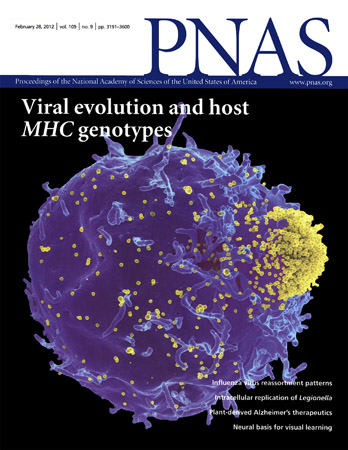
Biology Under Cover Abstract
Selected Journal & Book Covers from SBS Faculty
Experimental Viral Evolution to Specific Host Mhc Genotypes Reveals Fitness and Virulence Trade-offs in Alternative MHC Types
Jason L. Kubinak,James S. Ruff,Cornelius Whitney Hyzer,Patricia R. Slev, andWayne K. Potts
Cover Image
Pictured is a T cell shedding Friend murine leukemia viruses. Jason L. Kubinaketal. found that the Friend virus rapidly adapts to specific host major histocompatibilitycomplex (MHC) genotypes, with viral fitness and virulence substantially higher in familiar versus unfamiliar MHC genotypes. The findings support the antagonistic coevolution model of MHC evolution, with a never-ending molecular arms race between pathogens and hosts promoting the maintenance of MHC diversity. (cont.) Image courtesy of Elizabeth R. Fischer and Kim J. Hasenkrug (National Institute of Allergy and Infectious Diseases, National Institutes of Health, Hamilton, MT).
Abstract
The unprecedented genetic diversity found at vertebrateMHC(major histocompatibility complex) loci influences susceptibility to most infectious and autoimmune diseases. The evolutionary explanation for how these polymorphisms are maintained has been controversial. One leading explanation, antagonistic coevolution (also known as the Red Queen), postulates a never-ending molecular arms race where pathogens evolve to evade immune recognition by commonMHCalleles, which in turn provides a selective advantage to hosts carrying rareMHCalleles. This cyclical process leads to negative frequency-dependent selection and promotesMHCdiversity if two conditions are met: (i) pathogen adaptation must produce trade-offs that result in pathogen fitness being higher in familiar (i.e., hostMHCgenotype adapted to) vs. unfamiliar hostMHCgenotypes; and (ii) this adaptation must produce correlated patterns of virulence (i.e., disease severity). Here we test these fundamental assumptions using an experimental evolutionary approach (serial passage). We demonstrate rapid adaptation and virulence evolution of a mouse-specific retrovirus to its mammalian host across multipleMHCgenotypes. Critically, this adaptive response results in trade-offs (i.e., antagonistic pleiotropy) between hostMHCgenotypes; both viral fitness and virulence is substantially higher in familiar versus unfamiliarMHCgenotypes. These data are unique inexperimentally confirming the requisite conditions of the antagonistic coevolution model ofMHCevolution and providing quantification of fitness effects for pathogen and host. These data help explain the unprecedented diversity ofMHCgenes, including how disease-causing alleles are maintained.
